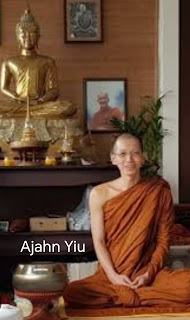No.405 - Insight isn’t something that can be taught.
It’s something you have to give rise to within yourself. It’s not something you simply memorize and talk about. If we were to teach it just so we could memorize it, I can guarantee that it wouldn’t take five hours.
But if you wanted to understand one word of it, three years might not even be enough.
Memorizing gives rise simply to memories.
Acting is what gives rise to the truth. This is why it takes effort and persistence for you to understand and master this skill on your own.
When insight arises, you’ll know what’s what, where it’s come from, and where it’s going—as when we see a lantern burning brightly:
We know that, ‘That’s the flame... That’s the smoke… That’s the light.’ We know how these things arise from mixing what with what, and where the flame goes when we put out the lantern. All of this is the skill of insight.
Some people say that tranquility meditation and insight meditation are two separate things—but how can that be true? Tranquility meditation is ‘stopping,’ insight meditation is ‘thinking’ that leads to clear knowledge.
When there’s clear knowledge, the mind stops still and stays put. They’re all part of the same thing.
Knowing has to come from stopping. If you don’t stop, how can you know?
For instance, if you’re sitting in a car or a boat that is traveling fast and you try to look at the people or things passing by right next to you along the way, you can’t see clearly who’s who or what’s what. But if you stop still in one place, you’ll be able to see things clearly.
Or even closer to home: When we speak, there has to be a pause between each phrase. If you tried to talk without any pauses at all, would anyone be able to understand what you said?
This is why we first have to make the mind stop to be quiet and still. When the mind stays still in a state of normalcy, concentration arises and discernment follows. This is something you have to work at and do for yourself.
Don‘t simply believe what others say. Get so that you know ‘Oh! Oh! Oh!’ from within, and not just ‘Oh? Oh? Oh?’ from what people say.
Don’t take the good things they say and stick them in your heart. You have to make these things your own by getting them to arise from within you.
Spending one dollar of your own money is better than spending 100 dollars you’ve borrowed from someone else. If you use borrowed money, you have to worry because you’re in debt. If you use your own money, there’s nothing to worry about.
* * *
In the same way, tranquility and insight have to go together. You first have to make the mind stop in tranquility and then take a step in your investigation:
This is insight meditation. The understanding that arises is discernment. To let go of your attachment to that understanding is release.
So stopping is the factor that gives rise to strength, knowledge, and discernment—the fixed mind that knows both the world and the Dhamma in a state of heightened virtue, heightened consciousness, and heightened discernment leading on to the transcendent.
~~~
From 'Stop & Think' in Food for Thought by Ajaan Lee Dhammadharo, translated from the Thai by Thanissaro Bhikkhu. https://www.dhammatalks.org/.../FoodForT.../Section0017.html
~~~~
Ajaan Lee explains why there's a need for the balanced development of both tranquility and insight in one's meditation practice.
This accords with the Buddha's explanation that correct meditation practice consists of the development of both insight (vipassana) and tranquillity (samatha) (AN 4.94: Samādhi Sutta).
If samatha precedes vipassana — or vipassana, samatha — one's practice is in a state of imbalance and needs to be rectified by seeking instructions from fellow meditators who have developed the other component.
Yet, many practitioners hold the view that only vipassana meditation leads to Awakening and that samatha meditation should be avoided.
See AN 4.94: Samādhi Sutta — Concentration (Tranquillity and Insight) {A ii 93} by Thanissaro Bhikkhu at
https://www.dhammatalks.org/suttas/AN/AN4_94.html)
24 March 2024
Copied
Photo credit. The owner who posted it.







































